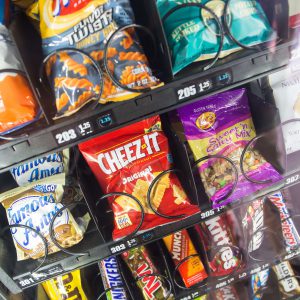
Convenient prepackaged snacks such as these can add extra salt, fat, and sugar to your diet. (Photo credit: Lyon Duong, UF/IFAS)
Snacks are an important part of a healthy, balanced diet. But not all snacks are created equal. All too often, we reach for the salty, sugary, prepackaged snacks like chips, cookies, and other sweets because they’re convenient and easy to grab and go. But be careful! Even if the portion size is small, these types of snacks can contain a lot of unnecessary calories. Even snacks marketed as healthy, such as trail mix, granola bars, and protein bars can contain added sugars and fats.
The Nutrition Facts label contains a wealth of information…if you know what you’re looking for. The number of total calories and calories from fat are listed at the top of the label. Ideally, snacks should contain less than 200 calories. Also, if the number of calories from fat is greater than 30 percent of the total calories, it may not be the best choice.
One of the biggest pitfalls when it comes to snacking is overeating. Snacks are meant to provide sustained energy to help keep blood sugar levels even throughout the day and to supplement calories and nutrients not provided by meals. They are not meant to be mini meals, so be careful of portion size. Check the label for what constitutes one serving and stick to it.
Prepare your own snacks instead of buying prepackaged convenience foods. Cut up fruits and vegetables and store them in snack bags that can be easily toted in your purse or bag. Keep small containers of nuts – preferably unsalted or lightly salted – in your desk or car for a high-protein on-the-go snack.
There are plenty of easy, delicious, and healthy snack choices from each food group. Here are a few examples:
Fruits: Bananas, melon chunks, apple slices, and orange wedges
Vegetables: Broccoli florets, carrot sticks, sugar snap peas, and zucchini sticks
Grains: Mini rice cakes, whole grain crackers, plain popcorn, and unsalted pretzels
Proteins: Nuts (e.g. walnuts, almonds, and pistachios), hard-boiled eggs, peanut butter, and pumpkin seeds
Dairy: Low-fat yogurt, string cheese, milk, and cottage cheese
Need more help with snacking healthy? Here are some terrific resources from the University of Florida IFAS:
“Healthy Eating: Sixteen Savory Snacks” – https://edis.ifas.ufl.edu/pdffiles/FY/FY70500.pdf
“Healthy Eating: Smart Snacking” – http://edis.ifas.ufl.edu/pdffiles/FY/FY70800.pdf
“Healthy Snacking” – http://edis.ifas.ufl.edu/pdffiles/FM/FM43900.pdf
“Raising Healthy Children: Promoting a Positive Feeding Experience” – http://edis.ifas.ufl.edu/pdffiles/FY/FY139700.pdf
- Plugging Spending Leaks - October 24, 2025
- Pets are Good for Mental Health - September 26, 2025
- Develop a Family Emergency Plan for Hurricane Season - June 30, 2025
